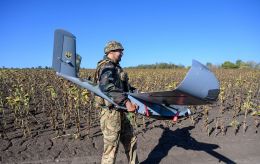Another magnetic storm in November: Who's at risk and when to expect it
 Magnetic storms from November 17 to 21: will they affect Ukraine (photo: Getty Images)
Magnetic storms from November 17 to 21: will they affect Ukraine (photo: Getty Images)
In the coming days, Earth will once again be covered by a wave of geomagnetic disturbances. According to forecasts from NOAA, ESA SWE, and SpaceWeather, unstable solar activity is expected from November 17 to 21, which may affect people's well-being and the functioning of various technologies. Below are the latest scientific forecasts, possible consequences, and tips on how to ease symptoms during these days.
Geomagnetic storm forecast for November 17 to 21
According to models from NOAA, NASA SDO, and ESA SWE:
- November 17, Monday: moderate activity, possible G1-level flares (Kp 4-5).
- November 18, Tuesday: a G1-G2 storm (Kp 5-6) is expected, most noticeable in the second half of the day.
- November 19, Wednesday: moderate G1-level storm (Kp 4-5), with activity gradually decreasing toward the evening.
- November 20, Thursday: a relatively calm situation is forecast, with minor fluctuations.
- November 21, Friday: residual impulses at Kp 4, corresponding to a moderate magnetic storm.
What a magnetic storm is
A geomagnetic storm is a response of Earth's magnetic field to a stream of charged particles from the Sun. Its intensity is measured on the Kp scale:
- Kp 4-5 is a moderate storm (G1), with possible mild discomfort.
- Kp 6-7 is a strong storm (G2-G3), with possible disruptions in power grids, GPS, and communications.
Impact on technology and communication
During a storm, the following may occur:
- Interruptions in satellite systems and GPS
- Reduced radio communication quality
- Voltage fluctuations in power grids
- Malfunctions in navigation devices
How storms affect people
Even moderate storms can cause:
- Headaches
- Dizziness
- Blood pressure fluctuations
- Fatigue
- Drowsiness
- Irritability
- Reduced concentration
Who is at risk
The most sensitive to geomagnetic fluctuations are:
- People with cardiovascular diseases
- Those with hypertension
- Weather-sensitive individuals
- Older adults
- Pregnant women
- Patients with chronic neurological or endocrine disorders
How to minimize the impact of a storm
Doctors recommend:
- Sleeping at least 7-9 hours
- Drinking enough water, reducing coffee consumption, avoiding alcohol, and energy drinks
- Reducing stress and both psychological and physical strain
- Adding vegetables, fruits, and fish to the diet, limiting salt and fats
- Walking more outdoors and ventilating rooms
- Following prescribed medication schedules
- Monitoring scientific forecasts and warnings
Earlier, we revealed which foods increase the risk of migraines.
Sources: NOAA Space Weather Prediction Center, ESA Space Weather Coordination Centre, NASA Solar Dynamics Observatory, PMC, BioMed Central, Nature.
This material is for informational purposes only and should not be used for medical diagnosis or self-treatment. Our goal is to provide readers with accurate information about symptoms, causes, and methods of detecting diseases. RBС-Ukraine is not responsible for any diagnoses that readers may make based on materials from the resource. We do not recommend self-treatment and advise consulting a doctor in case of any health concerns.

